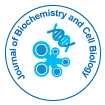Unsere Gruppe organisiert über 3000 globale Konferenzreihen Jährliche Veranstaltungen in den USA, Europa und anderen Ländern. Asien mit Unterstützung von 1000 weiteren wissenschaftlichen Gesellschaften und veröffentlicht über 700 Open Access Zeitschriften, die über 50.000 bedeutende Persönlichkeiten und renommierte Wissenschaftler als Redaktionsmitglieder enthalten.
Open-Access-Zeitschriften gewinnen mehr Leser und Zitierungen
700 Zeitschriften und 15.000.000 Leser Jede Zeitschrift erhält mehr als 25.000 Leser
Indiziert in
- Publons
- ICMJE
Nützliche Links
Open-Access-Zeitschriften
Teile diese Seite
Abstrakt
Differentiation of Acute Promyelocytic Leukemia Cells by All-trans Retinoic Acid and A Cyclin-Dependent Kinase Inhibitor Involves Dissociation of a CDK4/C/EBP ε Complex
Tsolkas G, Komninou D, Papanikolaou NA
Cell differentiation involves exiting the cell cycle and activating gene programs that are responsible for differentiation. The cyclin-dependent CDK4 kinase regulates the cell cycle at the G1/S stage and is an important molecule that contributes to tumorigenic mechanisms in nearly all neoplasms. CDK4 links the cell cycle to mitogenic/anti-mitogenic signals with unknown mechanisms cooperating with Cyclin D1. The cellular "decision" for differentiation or continuous proliferation occurs predominantly in the G1/S phase with mechanisms dependent on the type of cells with CDK4 kinase having a key role. We have recently demonstrated that the combination of sub-pharmaceutical doses of retinoic acid (ATPA) and CDK1/CDK2 inhibitors in acute promyelocytic leukemia (APL) cells induces degradation of CDK4 protein by simultaneously differentiating cells into granulocytes. In this paper we report that in proliferating NB4 cells, C/EBPε and CDK4 interact whereas treatment of the cells with a CDK1/CDK2 inhibitor and sub-pharmacological levels of all-trans retinoic acid leads to dissociation of the two proteins concomitantly with granulocytic differentiation of the leukemic cells. Our data suggest that CDK4/C/EBPε complexes may contribute to APL cell proliferation and that their dissociation may be required for differentiation.
Zeitschriften nach Themen
- Allgemeine Wissenschaft
- Biochemie
- Chemie
- Genetik und Molekularbiologie
- Geologie und Geowissenschaften
- Immunologie und Mikrobiologie
- Klinische Wissenschaften
- Krankenpflege und Gesundheitsfürsorge
- Landwirtschaft und Aquakultur
- Lebensmittel & Ernährung
- Maschinenbau
- Materialwissenschaften
- Medizinische Wissenschaften
- Pharmazeutische Wissenschaften
- Physik
- Sozial- und Politikwissenschaften
- Umweltwissenschaften
- Veterinärwissenschaften
Klinische und medizinische Fachzeitschriften
- Anästhesiologie
- Augenheilkunde
- Betrieb
- Dermatologie
- Diabetes und Endokrinologie
- Gastroenterologie
- Genetik
- Gesundheitspflege
- Immunologie
- Infektionskrankheiten
- Kardiologie
- Klinische Forschung
- Medizin
- Mikrobiologie
- Molekularbiologie
- Neurologie
- Onkologie
- Pädiatrie
- Pathologie
- Pflege
- Toxikologie
- Zahnheilkunde

 English
English  Spanish
Spanish  Chinese
Chinese  Russian
Russian  French
French  Japanese
Japanese  Portuguese
Portuguese  Hindi
Hindi